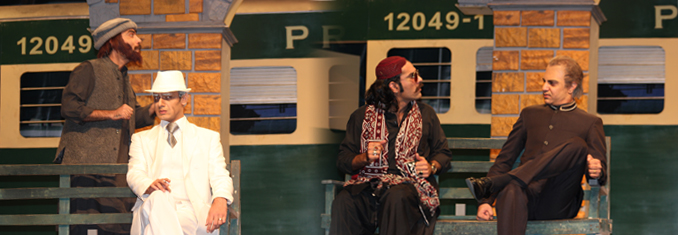Written by: Dr. Dushka H. Saiyid - Posted on: November 08, 2013 |  Comments
Comments
Google Translation: اُردو | 中文
---Yasir Hussain’s presence on the stage is electric. With him in the central role of Akbar in Angan Terha, the play broke all records with 101 consecutive shows in Karachi. It was more popular than both Pawney 14 August and Sawa 14 August, both of which were runaway successes having done under 300 shows in different cities. The late Saleem Nasir had played the role of Akbar for Pakistan Television, and entered the pantheon of PTV’s great performers; despite that added pressure, Yasir gave a stellar performance. He confessed that he had got so immersed in the role of Akbar, that he had difficultly becoming himself again. It was method acting at its best, but it took such a toll on him, that he decided to change his acting technique for the future.
I had been trying to track him down since seeing him on stage in Angan Tehra, but struck lucky when the Kopykats returned to do Sawa 14 Augustin Islamabad. He seemed smaller in real life, an unshaven bespectacled young man with tousled long hair and a fearsome moustache, grown for his new role in Sawa 14 August. I was curious to learn about the background that had produced this prodigy, and found him pleasantly loquacious and forthcoming.
His family loved watching movies, and not surprisingly, his brother opened a video shop. Yasir grew up on the usual Bollywood fare, listing Amir Khan, Amitabh Bachan, Mohammed Ali and Naseeruddin Shah as his favourite actors. The family had moved from Karachi to Rawalpindi when he was five, and he had enrolled at Qazi Foundation School, and later Asghar Mall College. He began to excel in extra-curricular activities from class VI onwards, and by the time he was in college, he knew that his passion was acting and he wanted to do little else.
He is matter of fact about the vicissitudes of his career, the injustices and slights that he experienced, so typical of our society: his experience at the NGO called Sachet, where he acted, wrote and directed plays, but was not given credit for it; he designed the set for Shah Sharabeel’s production of Phantom of the Opera, and was given the marginal role of a statue, for Sharabeel relied on references rather than auditions for the selection of actors. Involvement with a program for Pushtun youth on K2 channel was a learning experience, but his face lights up when talking about his work with USAID, as he got a decent remuneration and wrote and directed an interactive program for schools. His encounter with Geo, and its owner Mir Ibrahim, was more in the nature of a great escape; when they offered him a contract for two years, his free spirit panicked at the prospect of being tied down by a contract.
 |
Yasir began to get recognition with his performance in Dareecha, a popular soap written by Mohammed Ahmed for ARY. He has fulsome praise for Mehreen Jabbar, who directed him in Coke Kahani’s Kiya Life Hai; he also worked for ANB productions, but found television acting too restrictive, although he is appreciative of Faisal Qureshi and Noman Ejaz’s acting.
The meeting with Dawar Mahmood was life changing, and Kopykats productions was born. The name is ironic, given that Kopykats has a policy of doing only original plays, but maybe it’s a dig at kitsch Pakistani theater trying to do Broadway. Their first play was in Urdu, but called Come Again, as they had been told that unless it had an English name, people would not come to watch it. It did well enough, but they lost their auditorium because of the Lal Masjid crisis, and had to perform in the National Library, which was not equipped for theater performances.
Kopykats has pushed the boundaries of theater in Pakistan and made it into a popular medium. In no small measure this is due to Anwer Maqsood’s sharp and witty scripts. Their latest offering, Sawa 14 August, ran to packed halls, and the shows had to be extended by three days. Yasir played both the role of a Pathan and a Sindhi, a testament tohis versatility. Yasir is a prodigy, sensitive and self-effacing, whose raw talent has emerged to dazzle audiences despite a sterile,if not hostile environment. His Kashmiri Rajput family is not well disposed to his or his sister’s careers in acting and singing respectively. The government is more of a problem than help, charging Rs. 3 lakhs for three hours use of the Islamabad PNCA auditorium. Not surprising, since it is over-staffed, with 300 people on its rolls, and that is what the tax payer is subsidizing.